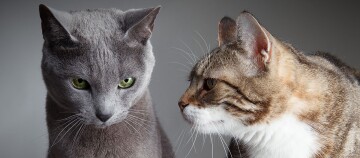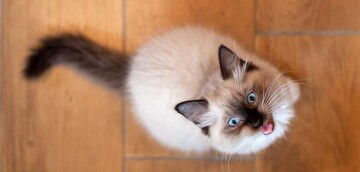Why does my cat lick me?
18.11.2024 - Reading time: 8 minutes

Cats lick their fur to clean themselves. However, it is also common for your cat to lick you. Read here why.
Cats are clean animals that spend a lot of time grooming themselves every day. You have probably already seen your cat wetting their paws with their tongue to clean their face. That's where the expression “having a cat wash” comes from. Does your feline not stop there and lick you as well? Find out here why your cat licks you.
Why does my cat lick my face?
From a young age, a kitten learns how to groom itself from its mother. This maternal grooming helps to clean the little ones and strengthens social ties. If you have several cats, you have probably noticed that they lick each other. If they do so, they get on well with each other. In fact, a cat only licks its relatives, the members of its group. So if you have asked yourself “Why does my cat lick my face at night?”, it’s part of their instinct and proves that they consider you as part of their family. Since, unlike their feline companions, you are busy most of the day and seem out of reach, they make the most of night time and your sleep to come and groom you. For them, shared grooming moments are associated with relaxation and well-being. When you’re sleeping, you’re also relaxing. Your cat will no doubt see this as an invitation to relax together. Even if you don’t mind your little furball’s rough tongue and find it cute, don’t forget that cat saliva can contain pathogenic germs. And if you think of all the parts of their body that your cat licks themselves, it’s clearly not hygienic to let them run their tongue over your face.
Why does my cat lick my mouth?
You may have already seen online videos posted by pet owners of what their little companions were up to during the night while they themselves were asleep. It’s always quite amusing and sometimes surprising. When they get the chance, many dogs and cats invade their owners’ bedrooms and often their beds as well. While you’re sleeping soundly, your cat may have settled comfortably on your pillow next to you. They just wanted a soft, cosy spot to take a nap next to their favourite human, but now they can sense a tempting scent. Have you eaten some tuna? Cats usually love that. The smell of fish is strong, and even if you’ve brushed your teeth well, your little feline’s finely developed sense of smell won’t miss it. As they don’t have any tuna, they’ll lick your mouth instead!
Why does my cat lick my hair?
You’re sitting on your sofa and watching your favourite series. Your adorable cat is sleeping peacefully next to you and then wakes up and decides that it’s all a bit boring. Getting into action, they come and give you a big cuddle, rub themselves against your neck and then start licking your hair. You may laugh at the moment and wonder if it’s time for a shower. It probably won’t change a thing. It may be your shampoo that’s causing your four-legged friend to lick your hair. If this is the case, there are two possibilities: they either really like the smell of your shampoo, or don’t like it at all. In the first instance, they are attracted by the smell and this encourages them to groom their family; in the second, they are trying to get rid of the bad smell by soaking you in theirs. Unless you want to smell like cat food, you need to make your furball understand that their behaviour is not acceptable. Do not stroke them as this would suggest that you like what they are doing. The best thing to do is get up and walk away. Go and get a cold drink from the fridge or make yourself a cup of tea. By the time you return, they’ll probably have found something else to do.

Why does my cat lick my hands?
Does your cat have a habit of following you into every room of the house or flat? They like to see what you’re doing and get a little stroke in the process. When they see you heading to the kitchen, they will be hoping to get some treats from you. If that doesn’t work, they’ll be patiently watching everything you do when you’re preparing a meal – many things may accidentally fall on the floor. And bingo! A little piece of cheese that isn’t going in the fondue! Your hands will also have the same irresistible smell as this cheese. If you’re asking “Why does my cat lick my fingers?”, the answer is simple: as soon as your cat notices the smell of food, for example when you stroke them, they’ll start licking your fingers. If your hands are clean and you haven’t touched any food recently, your cat may be licking your hand to show affection and groom you.
Why does my cat nibble me and then lick me?
Kittens that play together are not always very kind to one another: biting, rolling and chasing are all part of the fun. By playing like this, they quickly learn their limits. When you play with your cat, a slight nip is not a sign of aggression. It’s part of the game. A cat that nips doesn’t intend to hurt. They will show you their love by licking your fingers afterwards. When the cat’s tiny teeth hurt you, this is a bite. Sometimes, cats get carried away by the game and forget what is allowed and what isn’t. This is the case in particular for cats that have been weaned too early and are poorly socialised. As soon as this happens, you must stop the game and make it clear that your little friend has gone too far by walking away.
Why does my cat lick my feet?
While some cats love to sleep on their owner’s pillow, others aim directly for the opposite end of the bed. The reason why a cat wants to be close to your feet is linked to its survival instinct. The risk of being crushed by your body while they’re asleep would be too great if they were to lie next to you under the duvet. Cats rarely sleep next to their owner’s feet, but rather on their feet. If one of your feet sticks out of the duvet and is within reach of their tongue, your furball will show their affection by washing your feet with their saliva, whether you like it or not.
Why does my cat lick me and purr?
Most of the time a cat purrs because it feels at ease. This constant sound also has a calming effect on some cat owners. You probably associate your cat’s purr with relaxing moments spent with them on the sofa or in your favourite armchair. Cats love being stroked – but, of course, only when they want to be – and express their happiness through their innate behaviour of purring. To enjoy this moment of happiness even more, your cat will lick your hand or rub up against you. Did you know that there is a form of therapy for humans called purr therapy? Vet Jean-Yves Gauchet came up with it at the beginning of the 2000s. The beneficial effect of cats’ purring on people who are stressed, disabled or elderly has since been proven.
Why does my cat lick me all the time?
It’s a good sign if your cat tries to groom you from time to time. If they want to lick you constantly, it may be due to a condition such as feline hyperesthesia. Some breeds, particularly Siamese, Abyssinian, Burmese and Persians are more affected by this syndrome than others. Excessive licking can also be caused by a behavioural problem. If the problem persists, seek advice from your vet. If there is no evidence of any illness, you may be referred to a cat behaviourist. An anxious or stressed cat will also tend to lick more to soothe and reassure itself. You should therefore find the cause of this stress to eliminate it and ensure the well-being of your little friend.
You look after your cat with tenderness and they know how to return the favour by showing you their affection in their own way. So it would be wrong to tell them off or punish them when they lick your hands, feet or face. Cats are intelligent animals who quickly understand when their behaviour displeases you. Learn to understand the body signals they send you and provide them with good living conditions, but don’t let them become the master of your home. It’s up to you to decide the rules to follow for a harmonious life with your little feline.



